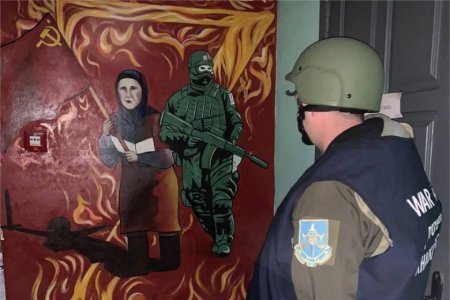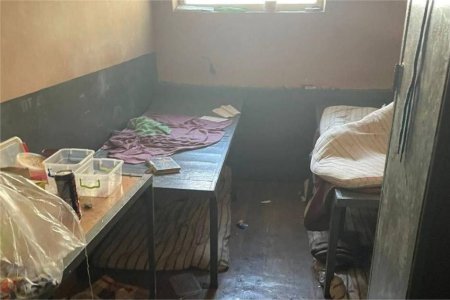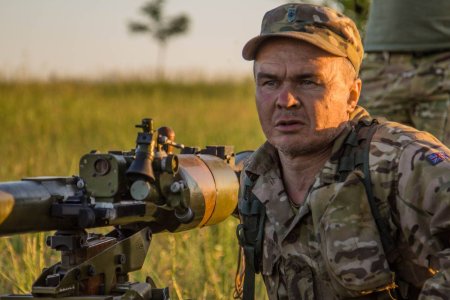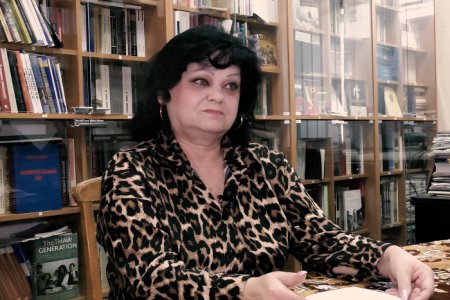My name is Yaryna Vyntoniuk. I am the representative of the organization “Animal Rescue Kharkiv “. In the organization, I am responsible for communicating with our partners, finding resources for the organization, and communicating with journalists. The organization has existed since 2016. During this time, a lot has changed. Since the beginning of the war, we had to work in entirely different conditions.
Last year, the rehabilitation center “Little Prince” opened. We needed a place to keep the rescued cats. We understood that they needed special conditions, something similar to home. That’s why the idea of the rehabilitation center appeared.
Today, we invite military personnel, children, and anyone who wants to come here. It is a kind of mutual assistance: for cats, it is the necessary attention, and for people, it is cat therapy.
We also have 500 rescued fish from Konstiantynivka. We have a turtle evacuated from Kurakhovo — Serafima. We are open for visitors every day from 12:00 to 18:00. You can come and spend time with the cats and thus help them.
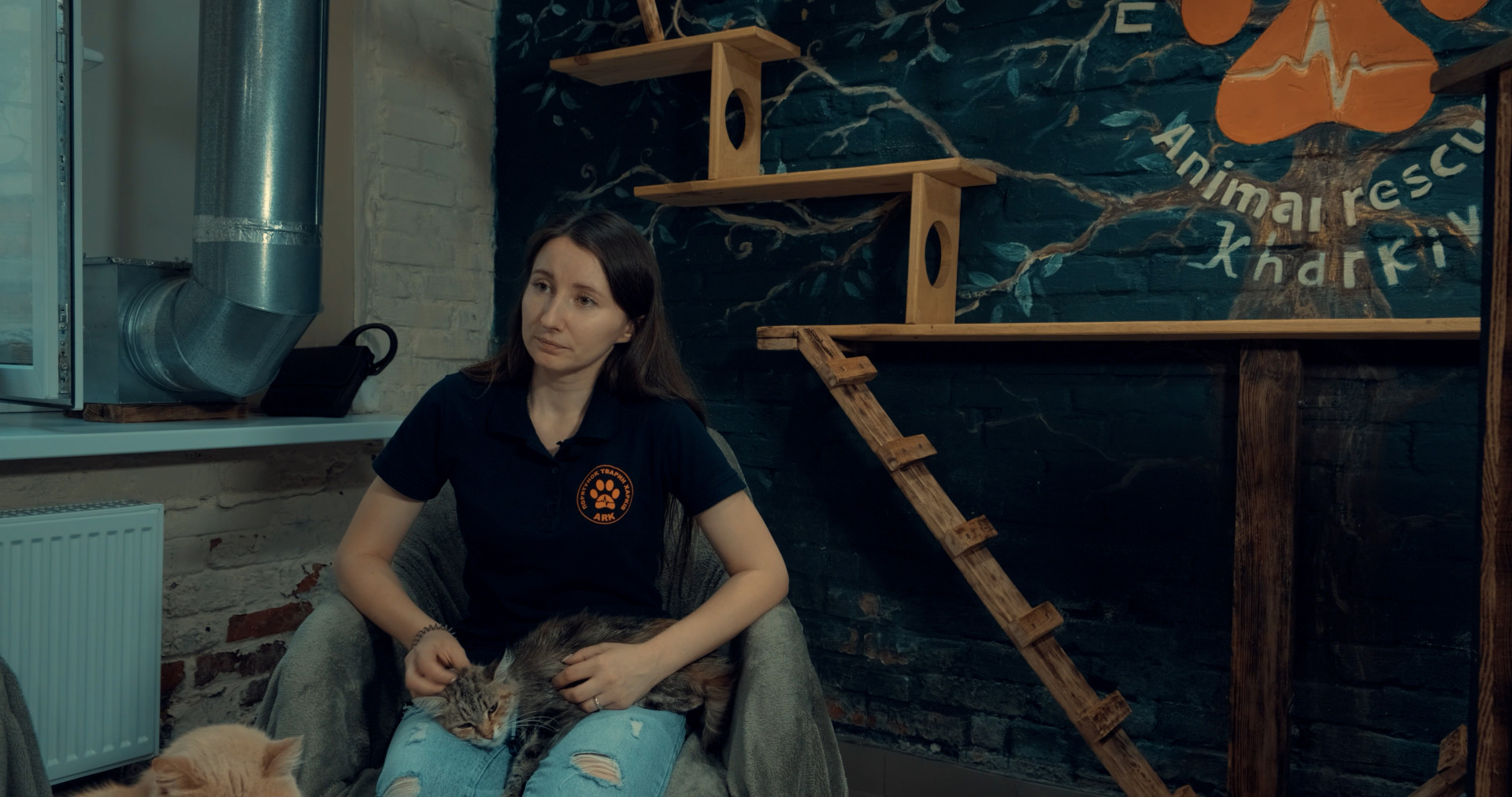
In addition to the rehabilitation center, our organization has a veterinary clinic, where we provide medical care to all rescued animals. We have also begun construction of a shelter for dogs and pets. In the future, we plan for children and anyone who wants to communicate with dogs and pets also to be able to come there.
Before the war, we rescued animals in Kharkiv; these were calls when an animal was drowning or when a dog or cat got into an accident—various situations where emergency human assistance was needed. With the start of a full-scale invasion, we simply continued to do what we did before the war. But on a different scale. Now, this is an entirely different volume of work. Applications began along the entire front line. From Donbass to Kharkiv region.
This work continues today since hundreds of animals are abandoned and need help. Therefore, we cooperate with the military, and civilians call us on the phone. When there is an escalation along the front line, we immediately feel it. When people are saved, the question of animals usually arises. Not everyone can take animals with them.

There are situations when people die, and animals are simply left to their fate. They seek salvation, they come to our military, and then we come. We take these animals to Kharkiv.
We went to Vovchansk several times a day since there were a lot of applications. And everything is in an accelerated intensive mode.
The Russians don’t care whether we are talking about saving civilians and animals. They shoot, basically, at everyone. And in Vovchansk, it was very noticeable, we lost 4 cars there. Our rescuer was injured.
Today, the organization employs about 100 people. These are people of entirely different professions. We also have professional veterinarians. But during the full-scale invasion, people who had never worked with animals, who lost their jobs, joined us—many displaced people. Today, our team consists of various professionals. But these are people who love animals—those who do not leave.
During the fighting in Vovchansk, our clinic became a stop point where all the animals were evacuated. Plus, people come to identify their animals. The animals are quarantined for two weeks, and we monitor them. It is not always possible to see if there are any problems with the animal, so we take two weeks to observe how the animal eats and whether any reactions will appear later.

Next is the issue of animal rehabilitation. Many arrive very scared, and sometimes, it seems that they have never known people. This is especially noticeable with cats. It happens that they do not go to the toilet for three days and do not eat because they are terrified. It is stress superimposed on stress. Therefore, they need time to get used to us, to people, to understand that no one plans to do anything evil to them, that they are fed. It is calm here, and everything is fine. They are safe.
Then we look for families or new places in shelters for them. We cooperate with various organizations, both in Ukraine and abroad. We vaccinate animals, chip them, and prepare documents. We have separate crews that transport animals around Ukraine and abroad. We cross the border with them.
Some Ukrainian dogs and cats already live in Europe. We are thrilled when we see their happy photos. Very striking changes!
We see what kind of animals we took from the war zone and what kind they have become when they found a home.
The issue of adoption in Ukraine is complicated now. People are uncertain; no one knows what will happen to them tomorrow. Many Ukrainians have gone abroad. We are all in a difficult situation. Many displaced persons who have left would like to take their animals, but they are not permitted to do so by those who rent out housing, or they live in a dormitory in one room and do not have the opportunity to take their animals. And this, again, complicates our work in finding new families.

We have a greater demand for rescue than for placement, of course. Therefore, we ask for help from various organizations worldwide that can spread information about our animals, who have the opportunity to take these animals and care for further adoption.
We have very positive examples of cooperation, for example, with the French organization “Les petis innocence”. They do not have their shelter, but they have foster families.
During the war, they have already found 300 families for 300 dogs.
Today, we need veterinarians and care workers at the clinic where animals are treated. We need volunteers who are ready to help disseminate information about animal adoption. We will always be busy because there is so much to do.

I need to be useful — it is vital. Today, this is my contribution to our victory. I feel that, in this way, I am in my place. I would not like to be somewhere abroad now and hide to feel safe. I simply could not live there, knowing there were problems and my help was needed. I know how I can help in this situation.
I understand how important this is for people. Sometimes, a person loses their home, city, or loved ones, and we return them a dog or a cat. The only thing that this person has left.
I understand this makes a person happy because they have saved something valuable.
One of our soldiers said: “I want you to know that in war, armor is critical, a helmet, a bulletproof vest — this is extremely important, but it is also vital to have armor for the soul.” They say: “Animals are what makes us human and what makes us feel alive.” Therefore, it is a very superficial vision when people think it is important to save only people.

Interview: Denys Volokha. Editing: Mariia Krykunenko. Editor: Emilia Prytkina
